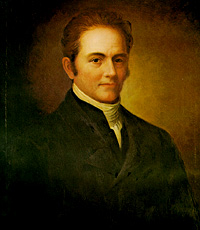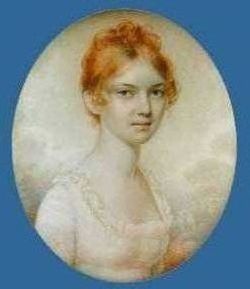Langdon Cheves
Langdon Cheves (* September 17, 1776 in Rocky River, South Carolina, † June 25 1857 in Columbia, South Carolina ) was an American politician and the ninth Speaker of the House. He also was president of the Second Bank of the United States.
Life
Cheves was born on the territory of present-day Abbeville County, South Carolina. His father Alexander Cheves was an immigrant from Scotland, his mother Mary Langdon came from Virginia. At the age of ten he went to Charleston, to earn his living, and was 16 years manager of a large trading house. Contrary to the advice of his friends, who thought he was a born merchant, he began to study law at the age of 18 years. In 1797 he got his approval and quickly became an important lawyer. By 1808 his annual income exceeded the 20,000 dollar limit and he was considered at that time as a wealthy man. Cheves married in 1806 his wife Miss Mary Elizabeth Dulles.
Policy
He took over in 1808 the post of Attorney General of South Carolina. In 1810 he was elected along with William Lowndes and John C. Calhoun in the U.S. House of Representatives and distinguished himself there very quickly. His speech at the dealer association in 1811 was a special example of his exceptional oratorical skills. The writer Washington Irving, who was also present, said that he had for the first time had an idea must have as the great poets of the ancient Greeks and Romans spoke. Cheves was an enthusiastic supporter of the British - American War of 1812.
House of Representatives
On January 19, 1814 Cheves, who belonged to the Democratic-Republican Party, the successor of Henry Clay as Speaker of the House was because Clay was sent as a representative to Ghent. In the election he triumphed over Felix Grundy. On 23 December 1814, he came after the death of the President Pro Tempore Elbridge Gerry, for two days in the direct line of succession to the presidency until two days later John Gaillard was elected president pro tempore. After 1815, the peace with Great Britain was concluded, he refused his re-election and returned to Charleston to work again as a lawyer. His successor in the office of Speaker of the House of Representatives was to be now of returned predecessor Clay. The following year he became a judge at the Superior Court of South Carolina.
National bank
In 1816, the National Bank was refounded, but ruined by mismanagement again within three years. Cheves was subsequently elected in 1819 as president of the bank and was able to rehabilitate the Institute within three years. He came back in 1822 from his post and was succeeded by Nicholas Biddle in office after.
Last years
After he had spent some time in Philadelphia and then in Lancaster (Pennsylvania), he returned back to South Carolina in 1829 and lived for the next 28 years in retirement on his estate in Columbia, where he died on 25 June 1857. In the last years of his life he wrote occasional essays and reviews.










